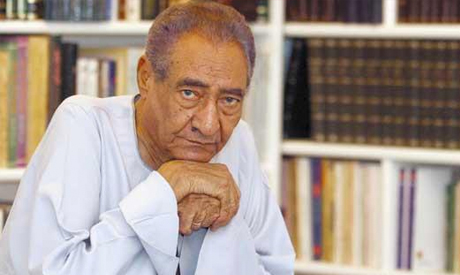The funeral of the late poet, who was nicknamed "The Uncle" for his ability to simultaneously empathise and inspire, is scheduled for Wednesday

Renowned Egyptian poet, writer and songwriter Abdel-Rahman El-Abnoudi, has died at the age of 76 after a long struggle with illness.
El-Abnoudi was born in 1939 in the village of Abnoud in Upper Egypt's Qena governorate. He migrated to Cairo from Upper Egypt in his early twenties during the late 1950s to pursue his dreams in the art world.

He is survived by his wife, TV host Nehal Kamal, and two daughters, Aya and Nour.
President Abdel-Fattah El-Sisi called El-Abnoudi's wife to offer his condolences. El-Sisi told Kamal that "his death is not only her loss but a loss to all of Egypt," As reported.

The president also ordered the Egyptian military to secure the late poet's funeral procession, scheduled to take place on Wednesday.

El-Abnoudi's most famous poetry works include the five-volume Sirat Bani Hilal (The Biography of Bani Hilal), Al-Mashrou' w al-Mamnou'(The Allowed and the Prohibited), Samt Al-Jaras (The Silence of the Bell), and Zahma (Crowdedness).

He also wrote song lyrics for some of the most famous Egyptian and Arab singers in the second half of the twentieth century such as Abdel-Halim Hafez, Mohamed Rushdie, Najat El-saghira , Shadia, Sabah and Mohamed Mounir.

El-Abnoudi gained popular admiration in the Arab world for his unique ability to turn tragic moments in Egyptian history into genial sonnets that provided both a sense of closure and hope to millions coping with adversity.

One of his most famous poems, Ada El-Nahar (The Day has Passed), which he wrote in aftermath of Egypt's bitter defeat to Israel in the 1967 six-days war, and was quickly turned into a song by Abdel-Halim Hafez, remains one of the most iconic patriotic songs in the memory of millions of Egyptians and Arabs.

Anas Donqoul, the brother of late poet Amal Donqoul, who was a close friend of El-Abnoudi, told reporters, "We've lost one of the most important poetry figures in Egypt and the Arab world."

It is a sad irony that El-Abnoudi, who was born in April, would also leave the world in April, he told .

"Egypt and the Arab world have lost a great poet and a sincere pen, a citizen who loved his country and the Arab nation," the presidency said in a statement released on Tuesday afternoon. "He enriched vernacular poetry through his poems, which reflected the authenticity of the Egyptian citizen and Egyptian reality, especially in Upper Egypt."

"He will be remembered as a patriotic Arab figure of whom we are all proud, and as an Egyptian who added another chapter of meaning to Egyptian creativity."